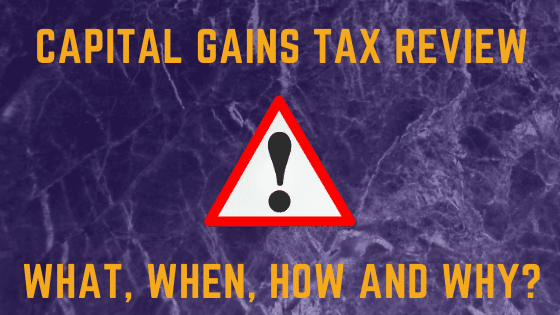Capital Gains Tax Review – will it be changing?
In my previous article about CGT we outlined what it is, and what the rates currently are.
I also highlighted that the Chancellor had asked the Office of Tax Simplification (OTS) to review the existing CGT structure and make recommendations for its simplification.
The first report entitled ‘Simplifying by design’ was published last week (November 2020), and you can read it in full here:
Capital Gains Tax review – first report: Simplifying by design
Some of the introductory writing is interesting and shows how thinking has changed over the years, which is perhaps an indication of where this is heading:
When capital Gains Tax was introduced in 1965, then then Chancellor had the following to say:
‘…gains confer much the same kind of benefit on the recipient as taxed earnings… [and]… the present immunity from tax of capital gains has given a powerful incentive to the skilful manipulator.’
In 1988 Nigel Lawson as Chancellor aligned CGT rates with income tax stated his reason for doing so because of
‘little economic difference between income and capital gains’
Gordon Brown in 1998 however argued that the
‘capital taxation system should better…reward risk taking and promote enterprise.’
as he replaced indexation allowance with the existing Taper Relief.
The CGT regime has not changed substantially in more than 20 years. And for the government to target CGT to raise additional taxes is seen as an easy win by many, as it currently impacts only roughly 265,000 people, as opposed to the ca 32 million individuals who pay income tax.
Those individuals paying CGT tend to be the wealthier individuals who are business owners, investors, and second property owners.
So what are this first report’s recommendations and what is the potential impact for consideration?
These were split into four key areas:
- Rates and Boundaries
- Annual Exempt amount
- Capital transfers
- Business Reliefs
Capital Gains Tax Review – let’s have a look at the recommendations:
It’s important to note that the report does talk about whether there should be come sort of tax incentive to encourage entrepreneurship and risk taking.
It also looks at areas where it feels that the current regime is open to avoidance, manipulation or wealthy individuals simply ‘playing the system’ by using up their capital allowances every year as a form of tax free income.
It also recognises that some of these changes have the potential to cause further complications in other areas of taxation such as Inheritance Tax, Corporation Tax, and indeed may increase the administrative burden on HMRC by introducing significantly more people to the requirement to file Self Assessment tax returns.
Rates and Boundaries
- To increase Capital Gains Tax to align it with income tax rates, or at least to close the gap between tax on income and tax on gains
- To reduce complexity of Capital gains tax by having only two rates rather than the current four
- To tax some or all retained earnings in a business on liquidation or sale at dividend rates
- To consider taxing more share based rewards for employees at Income Tax rates
Annual Exempt amount
- Reducing the Annual Exempt amount to £5000 to double the number of tax payers required to pay CGT
- Or reducing it further to £1000 per annum to triple the number of people required to pay
Capital Transfers
- Removing the capital gains uplift on death from any transfers where relief or exemption from Inheritance Tax applies, or
- Remove the capital gains uplift on death across the board, but also
- Consider rebasing all assets to a later year (currently 1982). The year 2000 is suggested
- Consider extending holdover relief beyond business assets
Business Reliefs
On Business Asset Disposal Relief, the government should consider replacing this relief with one more focused on retirement by considering:
- Increasing minimum shareholding from 5% to 25%
- Increasing holding period from 2 years to 10 years
- Reintroducing an age limit potentially aligned with pension freedoms
On Investors’ Relief
- Simple – Abolish it
Capital Gains Tax Review – what is likely to happen and when?
Well, the 2020-21 Budget has been delayed again until March 2021, so it is likely that any changes to Capital Gains and / or other taxes will be announced then.
While the Government does usually give plenty of warning to allow us to prepare for tax changes, these are unprecedented times. It is my opinion therefore (and this is a personal opinion only and does not in any way constitute advice, which I am neither qualified nor insured to give) that any changes are likely to be brought in from 6th April 2021 or shortly thereafter.
It might therefore be sensible to take advantage of the existing Capital Gains Tax while it lasts.
If the IN Team can be of any assistance, please do not hesitate to contact us.
Or if you would like an introduction to an Independent Financial Advisor to review your position and what action you may wish to consider taking before the end of this fiscal year, then we would be happy to introduce you to someone we trust who can help.
Disclaimer: As ever this article does not constitute advice and should not be taken as such







